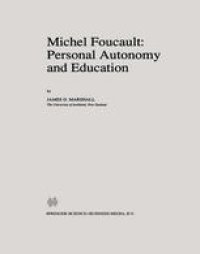
Ebook: Michel Foucault: Personal Autonomy and Education
Author: James D. Marshall (auth.)
- Tags: Philosophy of Education, Education (general), Philosophy, Philosophy of the Social Sciences
- Series: Philosophy and Education 7
- Year: 1996
- Publisher: Springer Netherlands
- Edition: 1
- Language: English
- pdf
This book is designed to serve two purposes. First it provides an introduction to the ideas and works of Michel Foucault. It should be particularly appropriate for education students for whom, in general, Foucault is a shadowy presence. Second, it provides a Foucault based critique of a central plank of Western liberal education, the notion of the autonomous individual or personal autonomy. There are several introductions to Foucault but they tend to be written from a particular theoretical position, or with a particular interest in Foucault's ideas and works. For example Smart (1986) and Poster (1984) exemplify the former, and Dreyfus and Rabinow (1983) the latter. There is no substantial work in education on Foucault, apart from Ball (1990), which is an edited collection of papers by educationalists. The writer started reading Foucault from a position in education which was in the liberal framework, somewhere between Dewey, Freire and Habermas, but with an interest in punishment, authority and power. The book is the outcome of several years of trying to introduce students in education to his ideas and works in an educationally relevant manner. But an introduction, on its own, cannot show this relevance to education. Unless his ideas are put to work, unless they are used as opposed to mentioned in some sphere or area of education, then they may be of little relevance.
There is now a considerable literature on Michel Foucault but this is the first monograph which explicitly addresses his influence and impact upon education. Personal autonomy has been seen as a major aim, if not the aim of liberal education. But if Foucault is correct that personal autonomy and the notion of the autonomous person are myths, then the pursuit of such an aim by educationalists is misguided. The author develops this critique of personal autonomy and liberal education from the writings of Foucault, and also considers Foucault's own educational practices. The author, James Marshall, who lives in New Zealand, has already written several articles for academic journals on Foucault.